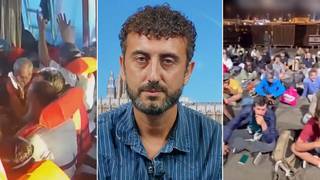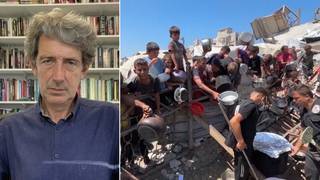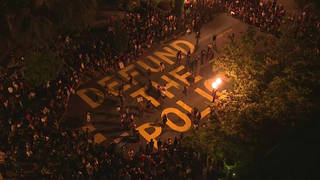
Guests
- Nekima Levy ArmstrongMinneapolis-based civil rights attorney, activist and executive director of Wayfinder Foundation.
- Jaylani Husseinexecutive director of the Minnesota chapter of the Council on American-Islamic Relations.
Protests continue in the Minneapolis area after a white police officer shot and killed a 20-year-old Black man, Daunte Wright, during a traffic stop Sunday in the suburb of Brooklyn Center. The deadly shooting took place about 10 miles from where former Minneapolis police officer Derek Chauvin is on trial for killing George Floyd. Just before he was killed, Wright called his mother to say he was being pulled over — allegedly because an air freshener was obscuring his rearview mirror. The Brooklyn Center police chief claims Kimberly Potter, a 26-year police veteran who has served as the police union president for the department, accidentally pulled a gun instead of a Taser. The Star Tribune reports Daunte Wright is the sixth person killed by Brooklyn Center police since 2012. Five of the six have been men of color. “Unfortunately, there has not been a serious attempt to change the phenomenon of driving while Black, which is something that happens to Black people on a routine basis in the Twin Cities and across the state of Minnesota,” says Minneapolis-based civil rights attorney and activist Nekima Levy Armstrong. We also speak with Jaylani Hussein, executive director of the Minnesota chapter of the Council on American-Islamic Relations, who says policing in the United States is as dangerous to Black and Brown people as ever. “They are deadly. They kill Black and Brown people,” says Hussein.
Transcript
AMY GOODMAN: We begin today’s show with a warning. A warning to our audience: This segment contains graphic footage and accounts of police violence.
Protests are continuing in the Minneapolis area after a white police officer shot and killed a 20-year-old Black man, Daunte Wright, during a traffic stop Sunday afternoon in the Minneapolis suburb of Brooklyn Center. The deadly shooting took place about 10 miles from where former Minneapolis police officer Derek Chauvin is on trial for murdering George Floyd. On Monday, police fired tear gas, rubber-coated bullets, stun grenades, as protesters defied a curfew and took to the streets, Brooklyn Center, for a second straight night. Police said 40 people were arrested. More than a dozen were also arrested during protests in Minneapolis.
Just before he was killed, Daunte Wright called his mother to say he was being pulled over — allegedly because an air freshener was obscuring his rearview mirror. On Monday night, Daunte’s aunt, Naisha Wright, called in to CNN.
NAISHA WRIGHT: My mother shouldn’t have to be burying her grandchild. My brother, my sister, they shouldn’t have to be burying their son. Not over air freshener. They stopped him over air freshener. Let’s get that correct. His tag wasn’t expired. My sister and them had just bought him that car. Y’all want a sitch — people want to try to look for something bad to go ahead and justify this. How about we just justify this man’s life was taken? They took my man’s life from him. My great-nephew has to now grow up not even knowing, not even being able to touch his father. You tell me: Is it all right to take somebody’s life, over what? A misdemeanor warrant just for some weed? You’ve got these politicians out here smoking weed. They ain’t dead.
AMY GOODMAN: That was Naisha Wright, the aunt of Daunte Wright, speaking to Don Lemon on CNN.
State authorities have identified the officer who killed Daunte Wright as Kimberly Potter, a 26-year police veteran who’s served as the police union president for the department. She’s been placed on administrative leave. On Monday, the police chief in Brooklyn Center claimed Potter accidentally pulled her gun instead of a Taser. The police department also released bodycam footage of the shooting.
KIMBERLY POTTER: I’ll tase you! Taser! Taser! Taser! Holy [bleep]! I just shot him.
POLICE OFFICER: Oh wow.
KIMBERLY POTTER: Yes!
AMY GOODMAN: According to the Star Tribune, Daunte Wright is the sixth person killed by Brooklyn Center police since 2012. Five of the six have been men of color. Brooklyn Center Mayor Mike Elliot, who is the town’s first Black mayor, spoke to reporters Monday.
MAYOR MIKE ELLIOT: Our hearts are aching right now. We are in pain right now. And we recognize that this couldn’t have happened at a worse time. We recognize that this is happening at a time when our community, when all of America, indeed all of the world, is watching our community, that we are all collectively devastated, and we have been for over a year now, by the killing of George Floyd, and that we continue to be distressed as we go through the Derek Chauvin trial. So, having a police-involved shooting happen in our community and killing a young man is heartbreaking and just unfathomable.
AMY GOODMAN: On Monday night, the Brooklyn Center City Council voted to give command authority of the police to the mayor you just heard, stripping the power from the city manager. Soon after the vote, the mayor announced that the Brooklyn Center’s city manager had been fired. Earlier in the day, the city manager refused to name the officer who shot Daunte Wright. He was questioned by civil rights attorney Nekima Levy Armstrong.
NEKIMA LEVY ARMSTRONG: So, can you instruct the chief to release her name?
CURT BOGANEY: I won’t do that at this moment, at this place.
NEKIMA LEVY ARMSTRONG: Why?
CURT BOGANEY: It would be inappropriate.
NEKIMA LEVY ARMSTRONG: It’s not inappropriate. What was inappropriate was killing Daunte Wright under those circumstances. So, you are working harder to protect a killer cop than a victim of police murder.
AMY GOODMAN: That was Nekima Levy Armstrong questioning Brooklyn Center City Manager Curt Boganey, just before he was fired.
Nekima joins us now from Minneapolis, a civil rights attorney, activist and executive director of Wayfinder Foundation. She previously served as president of the Minneapolis NAACP. We’re also joined by Jaylani Hussein, executive director of the Minnesota chapter of the Council on American-Islamic Relations.
And we welcome you both to Democracy Now! So, Nekima Levy Armstrong, let’s continue where you were questioning the man who was just fired, a city manager, who was in charge of the police, and now the police have been put under the mayor. Can you talk about what took place on Sunday and also why you felt it was so critical to lay these facts out?
NEKIMA LEVY ARMSTRONG: Thank you, Amy.
From our understanding, Daunte Wright was driving in his car, minding his own business — it was a new car — and he was pulled over, according to his mom, for having an air freshener hanging on his mirror. His mom was on the phone with him during that traffic stop, and she heard him asking the police, “Why are you pulling me over?” And then she heard them ordering him out of the car. And the next thing you know, the phone disconnects. A few minutes later, she gets a call back from the girlfriend who was in the car with him, letting her know that Daunte had been shot.
And in the aftermath of all of that, we went to the site where Daunte was killed. His body lay in the streets for five hours, waiting for the Bureau of Criminal Apprehension, apparently, to come and pick up his body. That agitated the crowd. Tensions were high. After Daunte’s body was removed, we went to the Brooklyn Center Police Department, where over a hundred young people were outside demonstrating. And one of the most shocking aspects of the situation was that the police chief and the city manager ordered that the lights be turned off all around the police station, putting us in significant danger.
JUAN GONZÁLEZ: Nekima Levy Armstrong, I want to go back to this issue of why Daunte was stopped. So much of policing over the past 20 years in America has been based on this theory of the “broken windows” theory. You stop and detain a, quote, “suspect” for a minor issue in the hope of being able to discover some bigger criminal activity. And this has been at the heart of so many of these stops. I’m wondering, from what you can tell, has this been a reigning policy in the Minneapolis area, as well? And has there been any attempt by city or police officials to change that policy?
NEKIMA LEVY ARMSTRONG: Unfortunately, there has not been a serious attempt to change the phenomenon of driving while Black, which is something that happens to Black people on a routine basis in the Twin Cities and across the state of Minnesota. Several years ago, African American residents and activists pushed for a bill that would end racial profiling. But legislators at that time did not follow through on their promises to address the issue. And so Black people in the Twin Cities and across the state of Minnesota are pulled over significantly — at significantly greater rates than our white counterparts. And it has sometimes led to the kinds of fatality that we saw with Daunte Wright, Philando Castile and many others.
JUAN GONZÁLEZ: And what do you know in terms of the history of this particular police officer, Kim Potter? She was identified as having been a union president, police union president, in the past, but also she was identified as playing a role in advising an officer in a previous killing, the 2019 killing of Kobe Dimock-Heisler?
NEKIMA LEVY ARMSTRONG: Yes. So, let me be clear about the fact that with this woman, Kim Potter, being a 26-year veteran, there is absolutely no plausible way that she mistook her gun for a Taser, or her Taser for a gun. It’s just unfathomable that she would even make that excuse.
In terms of a previous killing of a young Black man named Kobe Heisler, who had autism, Kim Potter was involved in advising the officers to take separate cars and other acts that they could take in order to try to cover up what happened to Kobe Heisler. His family has been in mourning since his life was taken. And he joins several other people of color who have been killed by the Brooklyn Center Police Department.
AMY GOODMAN: I wanted to bring Jaylani Hussein into the conversation, executive director of the [Minnesota] chapter of Council on American-Islamic Relations. Jaylani, you’ve been out on the street from the beginning of the protest. You were trying to get the police to calm down — this is afterwards — in how they dealt with the protesters. Can you lay out what you understood? And also, seeing that horrific videotape, it was other officers who stopped Daunte and his girlfriend as he’s talking to his mother on the phone, and he’s got air freshener, a little air freshener piece, hanging from the rearview mirror. But when you see that videotape, she doesn’t just draw the gun and shoot. You see it for a few seconds as she’s saying “Taser! Taser!” Isn’t there even a different color handle on the Taser? Wouldn’t someone say, “That is your gun”? But let alone why any of this had come to drawing guns on a young man who had some air freshener hanging from the mirror?
JAYLANI HUSSEIN: No, absolutely, absolutely. Thank you for having me.
And again, all of us right now sending our condolences to this family. And as I said yesterday, we don’t know what to say to families anymore. And sadly, but also, I think, the unfortunate reality is that as everybody’s watching the Chauvin trial right now, people have this idea, somewhat, that something has fundamentally changed to actually hold police accountable. And for this to happen right now is a testament that American policing is as dangerous as they are.
And as you mentioned this video, first of all, you know, police officers are trained to pull the Taser from the opposite side. And you’re right. The Taser has a completely different feel. It’s much lighter. And this officer, who’s been there for 26 years, should know better. But you’re right.
As I said yesterday and will continue to say, this officer did not believe in the humanity of Daunte Wright. And for her to immediately pull anything for a young man who was cooperating, a young man who followed instruction, a young man who showed no visibility of threat, to be shot in that manner is absolutely the reality of policing in America. They are deadly. They kill Black and Brown people. And this is exactly what has been happening. And this is why America really needs to wake up and policies have to be put in place to hold these killer cops accountable.
And I think many people are trying to dig themselves in the sand right now, thinking that, “Oh no, this did not happen.” It did happen. A young man was killed, while we’re watching the Derek Chauvin trial. And to be honest with you, Amy, it is just gut-wrenching.
And then, as you said, the evening, peaceful protesters standing outside the police station, not a single person — I was one of the few people there early — not a single person was even on the sidewalk of the police department until nearly 50 officers came with riot gear. And many of them had been planning for this during the — because of the Chauvin trial, this was already plans that they had. They came out, started to agitate protesters. And God forbid there was a major accident, because they were literally firing flashbangs and other types of projectiles at an apartment building, where children were in their home — literally, no regards for children, no regards for the families that even lived across the police department, a dangerous scene.
And we were on the call with the mayor, who, unfortunately, in this city, did not have authority. The city manager and the police chief did. And they refused — they refused to even talk to us. I remember talking to one of the officers on the scene. I said, “Who is in command?” They told us it was the police chief. And I said, “We need to talk to him.” And they said, “He is busy planning,” meaning he is busy terrorizing our community, and it is exactly what happened.
So, it is just an unfortunate time right now for all of us. But the unbelievable thing that happened in Brooklyn Center is exactly the reality that’s happened, and this will continue to happen, sadly, until something fundamentally changes.
JUAN GONZÁLEZ: And, Jaylani, I wanted to ask you about that. You mentioned you were on the phone with the mayor. Could you talk about this whole issue of this unelected city manager actually being in charge of the police? Many small towns and cities across the country use this system of city managers, but they are really accountable to no one, unlike the mayor or the city council. What was your sense of what happened there?
JAYLANI HUSSEIN: Yeah, Mike — the mayor, Mike Elliot, that night, was responsive to all of us. He got us on the phone. We talked to him about, on the scene, to remove the police officers, initially, where they had killed Daunte Wright. And he was working that entire night in communication with us and community leaders.
As you said, the charter of the city of Brooklyn Center has given full authority of this city manager to direct and lead the police department. And when the mayor, my understanding, called the city manager and told him of the demands that the community was making, he ignored it. He has ignored everything. He’s been there for 20-plus years. And so, yesterday, as you saw, we demanded for the firing of the city manager, the police chief and the officer.
And just the process that the police department has created, the policies that it’s created, to shield itself from any type of accountability was displayed, that they could not even fire the police chief until they fire, first of all, the city manager, until they change the charter amendment, or at least change an ordinance to be able to have control of the police department. And so, this is the reality. And this city, the mayor really couldn’t do anything, even though he was trying to plead to deescalate the situation, while the police was escalating.
AMY GOODMAN: And the governor, Walz, went right from talking about this to — he said he was going to — the Minnesota Legislature, demanding that legislation that was introduced after George Floyd was killed be passed. Jaylani Hussein, can you talk about why that has not happened yet?
JAYLANI HUSSEIN: Well, I mean, for folks who are not aware, I know Minnesota is a little bit of a flyover state, but this is one of the racist states in the union. It is racist because for the longest time, no policies around police accountability — or any other really serious issues have been raised — had been raised, but nothing has been done. Minnesota has one of the worst disparities in economics, in education for people of color. It continuously has been that and has gotten worse.
And politicians, including Democrats, have claimed that they’re addressing these issues, but when policies are presented to them, they have done nothing. We have been proposing nearly eight bills since this summer, and we have been faced with opposition. We have been faced with absolutely no action. And it’s been actually the Democrats. We haven’t even had a chance to even fight with Republicans, when Democrats have not failed. And the same Democrat leaders who were telling us that they care about these issues, who did not do anything last night, were talking about now it’s time to pass police accountability, where we were already in the middle of a reckoning with the killing of George Floyd and now the trial of Derek Chauvin and those officers.
So, I hope that maybe more people can wake up and see the reality that Minnesota, the state that killed George Floyd, has done nothing, while other states are trying to at least attempt to pass some legislation. So, I think people need to wake up and realize that this has never been a problem just in the Republicans, who really stand with the police, but also Democrats, who have failed to hold up their end of the bargain.
AMY GOODMAN: Jaylani Hussein, I want to thank you for being with us, executive director of the [Minnesota] chapter of Council on American-Islamic Relations.
When we come back, we’re going to talk about the Chauvin trial. Nekima Levy Armstrong, we’d like you to stay on with us, civil rights attorney, activist, executive director of the Wayfinder Foundation, former president of the Minnesota NAACP. And we’ll also be speaking with a former national president of the NAACP, Ben Jealous, as we look at the case of Derek Chauvin, but also who will be next to head the Civil Rights Division of the Department of Justice, which bears on all of this. Stay with us.












Media Options